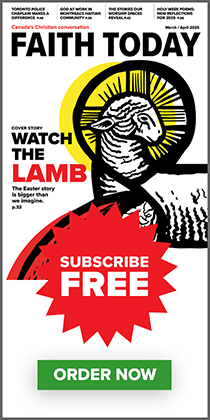Columnist Bruce Clemenger reflects on our ongoing political task.

→en français
Prices, pensions and employment levels are fluctuating unpredictably in response to tariffs and tariff threats. We’ve seen clashing ideas about our national priorities and what exactly binds us together during the recent federal election, as candidates and their party leaders proposed different approaches to the issues confronting us as a country.
Now we need to hear how our newly elected House of Commons will tackle the problems – and not tackle each other. Will constructive conversations about how to respond to national problems win the day?
Religious organizations like the EFC are required to be nonpartisan due to their charitable status, both during and between elections. It is a proper restriction. I can’t think of a time when a religious group’s endorsement of a party or a politician has worked out well in the long run for anyone involved.
The EFC’s task as a religious charity is not to represent the political views of a group of people. That is what political parties and interest groups do. While individuals can support parties, vote or run for elected office, the EFC’s task is to encourage civil and constructive engagement.
We identify a range of issues that – on the basis of the wisdom of the principles found in the Scriptures – we believe need to be addressed by Parliament. Many of these principles are woven into the fabric of our democracy. Freedom of speech and the right to civil disagreement. Religious freedom. Reconciliation. Stewardship. Care for vulnerable persons and groups. Upholding the sanctity of human life and the dignity of all.
We humbly contend for what we believe to be right – and do so with wisdom and speech characterized by grace.
When Christians press governments for justice, we bear witness to the truths of the Kingdom, which has justice and righteousness as its foundation (Psalm 89:14).
A critical element of our witness is not just the topics of our advocacy, but how we conduct ourselves as we present them. In political debates that are often vitriolic and mean spirited, we are called to be different. We are not to revile (Jude 8), slander (Titus 3:2) or mock our leaders (Acts 23:5).
“Through patience a ruler may be persuaded, and a gentle tongue can break a bone” (Proverbs 25:15). Here and elsewhere Scripture urges us to gentle persistence rather than violent or aggressive rhetoric.
 Scripture also encourages us to use logic and cooperation – “Come let us reason together” (Isaiah 1:18; Proverbs 29:22).
Scripture also encourages us to use logic and cooperation – “Come let us reason together” (Isaiah 1:18; Proverbs 29:22).
Christians are to engage as ambassadors of another Kingdom (2 Corinthians 5:20; James 3:17–18). Our diplomatic work is that of an advocate and peacemaker.
And we seek to live at peace with everyone (Romans 12:18; Hebrews 12:14). This does not mean we are to be silent or acquiesce, or practise willful blindness. We are to be witnesses to God’s truth. We humbly contend for what we believe to be right – and do so with wisdom and speech characterized by grace (Colossians 4:5–6).
In all we do we affirm the ultimate sovereignty of God. God rules over all. Power and authority exercised by persons or governments is a delegated authority, as all power and authority has been given to Jesus (Matthew 28:17; John 9:11). We also affirm that the state and political leaders should work for our good (Romans 13:1–4), for the good of all.
As the dust settles from Canada’s latest election campaign, our first priority as followers of Christ is to pray. Pray for our newly elected leaders that they may make wise and just decisions. Pray for our country that Canada will be a place of peace, freedom, justice and compassion.
We can also pray for the staff of the EFC and other groups who engage in Christian advocacy to our government. We can pray for those who supportively minister to our MPs, senators and their staff, particularly those new to the Hill.
May Christians be known in the halls of political power as a people who champion religious freedom, the sanctity of all human life, and the inestimable worth of everyone regardless of ability or age, as those who seek to bring peace, civility and constructive contributions to the public good. Come let us all gently and wisely reason together before the Lord who is sovereign.
Bruce J. Clemenger is senior ambassador and president emeritus of The Evangelical Fellowship of Canada, and author of The New Orthodoxy: Canada’s Emerging Civil Religion ( Castle Quay, 2022). Illustration: Get Illustrations/Unsplash+